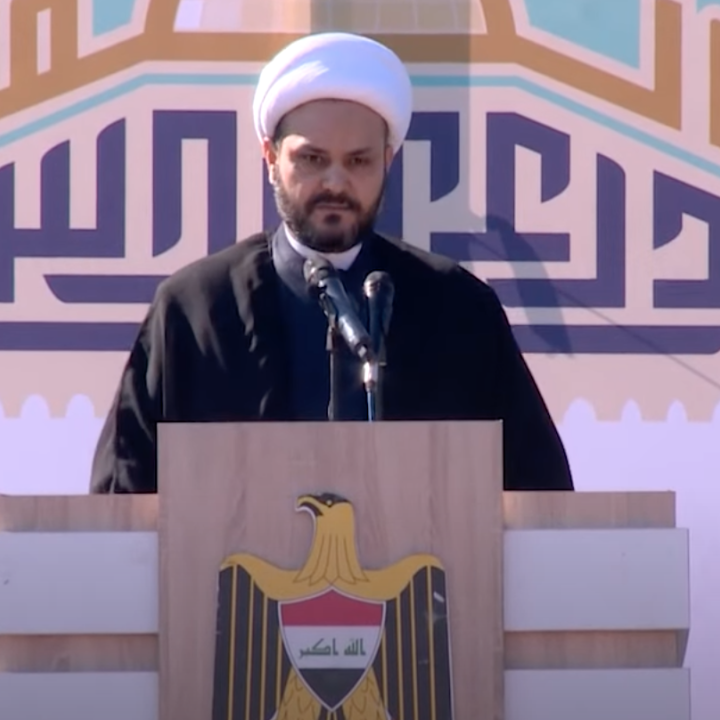
Akram Kaabi Feted in Quds Day Communiques

In an ungrudging division of labor, senior militia figure Akram Kaabi is being built up by other factions as the main anti-U.S. "resistance" leader in Iraq.
On April 14, the Iraqi muqawama (resistance) commemorated Quds (Jerusalem) Day with events in many cities. The main one was held by the Iraqi Resistance Coordination Committee (al-Haya al-Tansiqiya lil-Muqawama al-Iraqiya, or Tansiqiya for short) on Baghdad's Palestine Street, hosted by Ziyad al-Nakhalah, the leader of Palestinian Islamic Jihad, and Mohammad Kazem al-Sadeq, Iran’s ambassador to Baghdad. During the event, Akram Kaabi, the leader of the Iran-backed militia Harakat Hezbollah al-Nujaba (HaN), delivered a speech that various muqawama media described as an official statement of the Tansiqiya (Figure 1), including HaN’s own al-Nujaba TV, the network al-Etejah TV (run by Kataib Hezbollah), and the network al-Ahd TV, run by Asaib Ahl al-Haq (AAH).
Among the major Quds Day speeches delivered this year, Kaabi's was the most strongly worded—and the only one delivered by a top-tier muqawama leader about the U.S. presence in Iraq. One section attacked U.S. ambassador Alina Romanowski: “We clearly indicate the encroachment and humiliation practiced by the American ambassador of evil...We warn her against interfering in the internal affairs of Iraq, and if these cheap and rejected practices do not end...the muqawama will have the final say in that, and using deterrent methods and means with definitive results will be legitimate. The so-called American ambassador is sitting in a definite military base and barracks falsely called the embassy...We declare our steadfast position on our rejection of the presence of an American military base in the center of Baghdad.”
In fact, the statement denounced any U.S. military presence in Iraq: “We also affirm our rejection of any agreement that legitimizes the existence of the occupation in any way...We categorically reject the presence of any American forces in our skies or on our land, whether they are combat, advisory, training forces, or otherwise...[These] forces will remain a legitimate target for us, and we will work to pursue and expel them, not only from Iraq, but from the entire West Asian region.”
Significantly, leaders of groups such as AAH and the Badr Organization did not attend this event, leaving Kaabi with the entire spotlight to deliver his anti-U.S. message. Other muqawama leaders delivered their own Quds Day speeches at other events but did not touch on the status of U.S. troops. For example, AAH leader Qais al-Khazali offered a recorded speech in which he attacked the United States for supporting Israel but did not mention American forces in Iraq (Figure 2).
At first glance, one might conclude that Khazali was being careful not to cause trouble for the government of Prime Minister Mohammed Shia al-Sudani, since AAH plays an important role in this administration and regards it as favorable to muqawama interests (e.g., characterizing it "a muqawama government" overseen by "general manager" Sudani, with AAH and other top militias making the big decisions). Yet AAH also essentially endorsed Kaabi's virulent speech by broadcasting it live on al-Ahd TV and calling it a statement of the Tansiqiya, of which AAH is a self-described member.
These and other developments indicate that Kaabi has monopolized the role of leader of the kinetic "resistance" since Sudani took office, while other groups such as AAH play a key role in parliament and the government to facilitate muqawama infiltration of state institutions. Indeed, Kaabi and HaN increasingly appear to be leading violent kinetic operations against U.S. forces, mainly in Syria. This division of labor explains why muqawama social media channels such as Sabereen News now call Kaabi "the chief of staff of the muqawama" (Figure 3).
This reinforces Militia Spotlight's longstanding assessment from January 2022 that Kaabi has inherited the anti-U.S. "resistance" mantle, one of three main roles formerly played by the late Abu Mahdi al-Muhandis. Kataib Hezbollah figure Abu Fadak has been focusing on the second role: chief of staff of the Popular Mobilization Forces (PMF). The third role—organizing Shia politics—is still up for grabs, with Khazali in the lead but closely contested by Nouri al-Maliki and Hadi al-Ameri.







